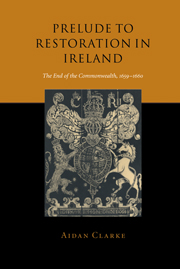Book contents
- Frontmatter
- Contents
- Acknowledgements
- Conventions and abbreviations
- Map: Representation in the General Convention
- 1 A kind of colony
- 2 Commissioners and submissioners: May to June
- 3 The rule of the rump: July to October
- 4 The threefold cord: October to December
- 5 Setting up for themselves: January to February
- 6 The election returns
- 7 The General Convention of Ireland: March to April
- 8 Without expectation of resurrection: May to June
- Appendix: Members of the General Convention
- Select bibliography
- Index
4 - The threefold cord: October to December
Published online by Cambridge University Press: 28 July 2009
- Frontmatter
- Contents
- Acknowledgements
- Conventions and abbreviations
- Map: Representation in the General Convention
- 1 A kind of colony
- 2 Commissioners and submissioners: May to June
- 3 The rule of the rump: July to October
- 4 The threefold cord: October to December
- 5 Setting up for themselves: January to February
- 6 The election returns
- 7 The General Convention of Ireland: March to April
- 8 Without expectation of resurrection: May to June
- Appendix: Members of the General Convention
- Select bibliography
- Index
Summary
The army's attempt to put a government in place was unsuccessful. Though a few members of parliament cooperated, the majority refused to compromise and nine members of the council of state, with Thomas Scot as president, claimed authority. An assurance from Monck that he would bring his army from Scotland to their support if necessary both confirmed them in their resistance and forced Lambert to march north to counter the threat. Parallel attempts to resolve the Anglo-Scottish disagreements and to arrive at a constitutional settlement led to a conference at which the representatives from Scotland were mandated to insist that the rump should sit until 6 May 1660 and be charged with determining the future constitution. In fact, on 15 November, they agreed to an arrangement by which a special general council of the whole army composed of two commissioned officers from each regiment in England, Scotland and Ireland would convene on 6 December and alone determine the form of a future parliament: in addition, a special committee would decide on qualifications for membership. The council in Edinburgh sent new commissioners to reinforce the existing ones and renegotiate the treaty, but without success: the disagreements could not be reconciled, Monck repudiated the treaty on 24 November and the army in England proceeded without Scottish support. On the day after the treaty, two of the ‘Nine’ met Monck's commissioners.
- Type
- Chapter
- Information
- Prelude to Restoration in IrelandThe End of the Commonwealth, 1659–1660, pp. 92 - 130Publisher: Cambridge University PressPrint publication year: 1999



